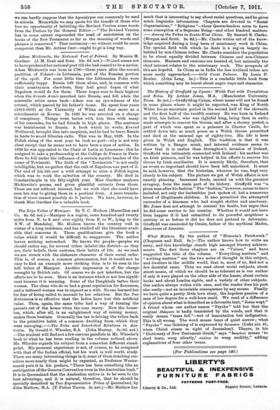Adam Mielciewits. the National Poet of Poland. By Monica M.
Gardner. (J. M. Dent and Sons. 10s. 6d. net.)—Poland seems not to have produced her national poet till she had ceased to be a nation. Adam Mickiewitz was born in 1790—three years after the second partition of Poland—in Lithuania, part of the Russian portion of the spoil. For some little time the Lithuanian Poles were sufficiently happy. Russia left them alone, and, in common with their countrymen elsewhere, they had great hopes of what Napoleon would do for them. These hopes rose to their highest when the Grande Annie marched into Russia, and fell when the miserable relics came back—Adam was an eye-witness of the retreat, which passed by his father's home. He spent four years (1815-1819) at the University of Wilna and four more as a schoolmaster at Kowno. In 1823 he was arrested on a charge of conspiracy. Things went better with him than with many of his comrades, for he had friends in high places. The sentence was banishment to Russia. A book which he wrote, Konrad Wallenrod, brought him into suspicion, and he had to leave Russia in haste to avoid Siberian exile. This was in May, 1829. In the Polish rising of the next year he took no part—why is not very clear except that he seems not to have been a man of action. In 1839 he was appointed to the Chair of Latin at Lausanne : this he resigned to take a professorship at the College de France in Paris. Here he fell under the influence of a certain mystic teacher of the name of Towianski. The faith of the " Towianists " is not easily intelligible, but we gather that the cult of Napoleon was part of it. The end of his life saw a wild attempt to raise a Polish legion which was to work the salvation of the country. He died in Constantinople in his fifty-eighth year. Miss Gardner analyses Mickiewitz's poems, and gives plentiful extracts from them. These are not without interest, but we wish that she could have seen her way to giving them in a poetical form. A mere transla- tion of verse cannot possibly do it justice. We have, however, to thank Miss Gardner for a valuable book.






























































 Previous page
Previous page